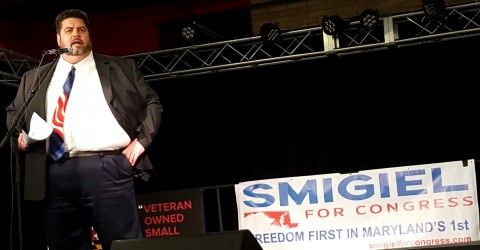It’s been almost three years since this was a regular feature on my site, but it appears I may have to bring this back to deal with all the stuff that I receive and deem to be somewhat newsworthy – just not enough to devote an entire post to. Ideally I can use it to clean out an e-mail box that gets too full of stuff that otherwise sits for awhile. As always, we’ll see how it goes but it’s been long enough that I had to go look up where I was in the series.
If you recall when I discussed the state convention last week, Maryland National Committeeman Louis Pope was pleased with the national GOP’s fiscal situation and it was also announced that the state party was finally out of debt. So it’s interesting to find out our national Democratic counterparts are doing what they do best: spending money they don’t have. Even with Martin O’Malley still in the race, they can’t just raise taxes to cover the difference.
It’s doubtful that Hillary’s campaign will be hurt, but Democrats are also salivating over retaking the Senate as the seats won by the GOP in the first TEA Party wave of 2010 come up for re-election in a Presidential year. That’s where a shortfall could come into play.
Speaking of the state convention, the sponsor of the amendment which actually stripped the voting rights of three auxiliary organizations now questions his own standing in introducing the amendment in the first place. It’s the ultimate in do-overs, but we have to ask whether he would have been as honest had the proposal passed.
Now Tony Campbell wants a special convention to right what was made wrong.
In discussing this with a former Chair, one thing that I learned is that seldom does an individual vote matter on the Executive Committee – there is rarely a time when a vote is close enough to make a difference. The only instance he could think of where a vote was close like that was the vote of no confidence in former Chair Jim Pelura back in 2009. That was still a relatively lopsided vote, 20 to 10, but the county chairs only voted 14 to 10. It was the six leadership and auxiliary votes that padded the margin.
(It’s also a rare time of late that I cite the balky and ad-bloated Red Maryland site, but you’ll notice the reason for the exception.)
So I think we should deal with this in due course. Perhaps we can do like we do for government “shutdowns” and give the auxiliary organizations their votes later as back votes once we rectify the situation, as I know we will.
Staying with the Maryland GOP, a few days back I received a list of 61 Republican leaders throughout the state who are backing Delegate Kathy Szeliga in her U.S. Senate bid. As you may expect, there are a lot of General Assembly members on the list: locally it includes Delegates Christopher Adams, Carl Anderton, Mary Beth Carozza, and Charles Otto as well as Senator Addie Eckardt and County Executive Bob Culver. 42 of 50 Republican Delegates and 13 of 14 GOP Senators are on the list. (George Edwards of western Maryland is the recalcitrant Senator.)
But I noticed one name among the local delegation was missing: it looks like Delegate Johnny Mautz has kept his powder dry for the moment. I can’t figure out if he just didn’t want to sign or if he’s backing someone else – with his Congressional staffer connections, he would be a logical backer of Richard Douglas. Just grist for the mill.
I haven’t even started to make my mind up on the race, but I will say Kathy has a long way to go to get my support – if only because her campaign website is still bare-bones a couple weeks after she jumped into the fray. That’s the type of lack of attention to detail that can sink a campaign.
Ethanol hasn’t been in the news much lately, but I thought it was worth pointing out that one of my favorite energy writers, Marita Noon, recently detailed how Ben Carson has moved to the right side of the issue. API’s Linda Rozett adds her two cents as well, making the case that dairy subsidies didn’t work out well so neither are ethanol carveouts creating the desired effects. Look, when we have plenty of oil there’s no real need to use food for fuel, despite what the corn growers who are enjoying the artificial price support may say.
Of course, people like me who believe food shouldn’t be used as fuel tend to fall into the category of climate change “deniers.” The folks at Organizing Against America For Action are excited about events in Paris. (Not the Friday the 13th ones, although this could be just as detrimental to millions.) In an e-mail exhorting supporters to “call out” skeptics, they say:
Remember when getting an elected official to even mention carbon pollution or climate change was a big deal? We’ve come a long way.
Today, the momentum for action has never been greater. Climate change denial in America is at an all-time low, and hundreds of companies have come out to support rules on power plant pollution. As if that wasn’t enough, religious leaders like Pope Francis are insisting that there is a moral obligation to address climate change.
In just two weeks, more than 160 nations, representing more than 90 percent of the world’s carbon pollution, are joining together for an international conference to tackle climate change, while we still can.
I dare them to call me out. YOU ARE A FRAUD. We’ve been holding steady on global temperature since the turn of the millennium, and if anything the indications are we are getting colder, not warmer. Throttling back the economies of the developed world will only weaken the rest of the planet.
Yet there are people talking common sense:
Climate change deniers are trying to spoil this big moment by undermining America’s commitment to act on climate change.
Some senators, like James Inhofe and Mitch McConnell, are going out of their way to undermine American commitments. Senator Inhofe, famous for bringing a snowball onto the Senate floor as proof that climate change doesn’t exist, has committed to crash the talks and be a “one-man truth squad,” telling the international negotiators how little he believes in climate science.
Senator Inhofe isn’t alone. Back at home, climate change deniers in both chambers of Congress are working to overturn the carbon pollution standards for power plants.
Good. I hope they succeed in overturning the job-killing restrictions. Just call me the Republican uncle, except I can do more than recite talking points.
Killing – not of jobs, but of fellow public housing residents – may not be out of the realm of the 6,000 drug convicts the Obama administration is releasing, and thanks to Judicial Watch we also know that they will be welcomed into public housing. I will grant that probably 99% of them will be more or less model citizens, but that still leaves a few dozen miscreants to cause trouble. I think Judicial Watch has reason to be concerned, as do those residents who get them as neighbors. Perhaps the same sort of notice granted when sex offenders move nearby is in order, at least to start. Call it a probationary period.
Finally, let’s end on a happier note. I wrote about a similar event last year, but over the weekend we were encouraged to participate in the Made in the USA Christmas Challenge by the Patriot Voices advocacy group. While most of the electronics we use are made overseas, it is possible to purchase gifts made in America. (One familiar group has some suggestions.)
It’s worth noting, though – as of this writing, just 116 have signed up at Patriot Voices. That’s not very many patriots, so hopefully more people than that are conscious of the advantages of supporting our businesses.
So there you have it – you are more informed and I have a clean inbox. I love it when a plan comes together.




